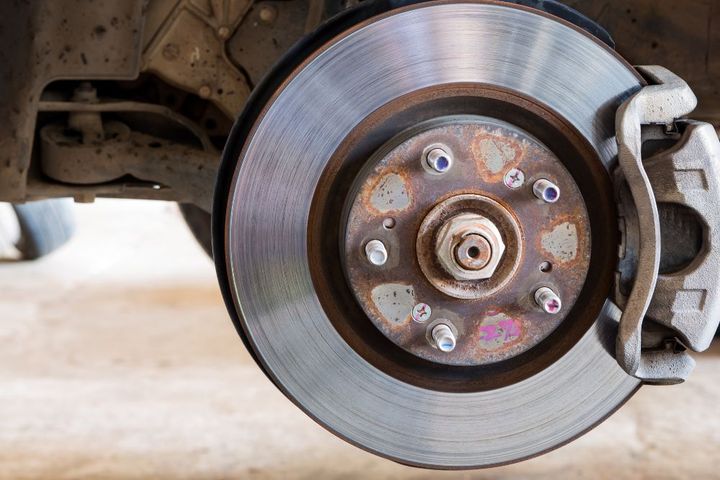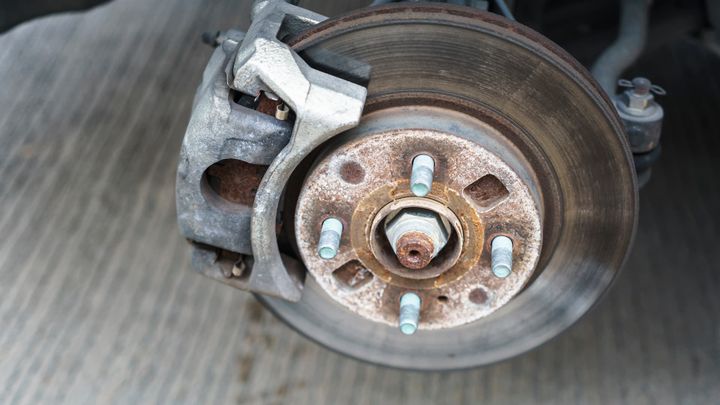


The braking system is a critical component in any vehicle, responsible for slowing down and stopping the car safely. However, under certain conditions, the brake fluid can overheat and boil, leading to a loss of braking efficiency and potential safety hazards. Understanding the symptoms of boiled brake fluid and an overheated braking system is crucial for timely identification and proper maintenance.

Brake fluid is a crucial component of a vehicle's braking system, responsible for transferring the force applied to the brake pedal to the brake calipers or drums. However, when this fluid becomes overheated, it can start to boil, leading to a range of concerning symptoms.
| Brake Fluid Properties | Description |
|---|---|
| Hygroscopic Nature | Brake fluid absorbs moisture over time, lowering its boiling point and making it more susceptible to boiling under high temperatures. |
| Heat Transfer Ability | Fresh brake fluid effectively transfers heat away from the braking components, but this ability diminishes as the fluid ages or becomes contaminated. |
| Boiling Point | The boiling point of brake fluid varies depending on its quality and condition, with higher-quality fluids having a higher boiling point. |
There are several primary causes that can lead to brake fluid boiling:
Contaminated or Old Brake Fluid
Excessive Brake Use
Brake System Issues
Let's explore each of these in more detail.
As mentioned earlier, brake fluid is hygroscopic, meaning it absorbs moisture over time. As the fluid becomes contaminated, its boiling point decreases, making it more susceptible to boiling under high temperatures. Additionally, old brake fluid loses its ability to transfer heat effectively, leading to overheating.
Riding the brakes frequently or engaging in heavy braking, such as when descending steep hills, can generate extreme temperatures in the braking system. This is particularly common in performance driving or when towing heavy loads.
Problems like stuck or dragging brake calipers, faulty brake hoses, or issues with the master cylinder can cause excessive heat buildup, leading to boiled brake fluid.
| Brake System Issue | Description |
|---|---|
| Stuck Calipers | Calipers that fail to release properly can cause constant friction and heat buildup. |
| Faulty Brake Hoses | Damaged or leaking brake hoses can lead to fluid loss and air entering the system, reducing heat transfer efficiency. |
| Master Cylinder Issues | Problems with the master cylinder, such as internal leaks or seal failures, can cause brake fluid contamination and overheating. |
As a mechanic, I've learned to identify the telltale signs of boiled brake fluid. Here are some common symptoms to watch out for:
Spongy or Soft Brake Pedal
Increased Brake Pedal Travel
Reduced Braking Performance
Brake Warning Light Illuminated
Hissing or Bubbling Sounds
Let's dive deeper into each of these symptoms.
One of the most noticeable signs is a brake pedal that feels spongy or soft when depressed. This is caused by the presence of air bubbles in the boiled fluid, which reduces the hydraulic pressure in the system.
If you find yourself having to press the brake pedal further down than usual to achieve the desired braking force, it could be an indication of boiled brake fluid.
When the brake fluid boils, it can lead to a significant reduction in braking performance, making it harder to stop the vehicle effectively. This is a serious safety concern and should be addressed immediately.
In some cases, the brake warning light on the dashboard may illuminate, alerting you to a potential issue with the braking system. While this could be caused by various factors, boiled brake fluid is a common culprit.
If you hear hissing or bubbling sounds coming from the brake fluid reservoir, it's a clear sign that the fluid is boiling or has already boiled. This audible cue should not be ignored, as it indicates an immediate need for attention.
If you suspect that your vehicle's brake fluid has boiled, it's crucial to address the problem promptly to ensure your safety and prevent further damage to the braking system.
The first step in repairing boiled brake fluid issues is to replace the contaminated fluid with fresh, recommended brake fluid. Here's the process:
Safely raise and support the vehicle.
Locate and open the bleeder valves on each brake caliper.
Pump the brake pedal to flush out the old, boiled fluid.
Refill the master cylinder reservoir with fresh, recommended brake fluid.
Bleed the brakes to remove any remaining air from the system.
| Brake Bleeding Sequence | Description |
|---|---|
| Farthest to Nearest | Bleed the brakes in the recommended sequence, typically starting with the caliper or wheel cylinder farthest from the master cylinder. |
| Proper Fluid Type | Always use the correct brake fluid type specified by the vehicle manufacturer. |
| Avoid Contamination | Avoid getting brake fluid on painted surfaces, as it can cause damage. |
| Check for Leaks | After the repair and bleeding process, check for any leaks in the system. |
In some cases, boiled brake fluid may be a symptom of a more significant underlying issue. Depending on the root cause, additional repairs may be necessary, such as:
Replacing damaged brake hoses or lines
Rebuilding or replacing faulty brake calipers or the master cylinder
Resurfacing or replacing worn brake rotors or drums

While addressing boiled brake fluid is crucial, preventing the issue from occurring in the first place is even better. Here are some maintenance and usage tips to help you avoid this problem:
Follow the manufacturer's recommended brake fluid change intervals, typically every 2 years or 30,000 miles.
Inspect the braking system regularly for any signs of wear or leaks.
Consider upgrading to a higher-quality brake fluid with a higher boiling point for performance driving or towing applications.
| Maintenance Task | Frequency |
|---|---|
| Brake Fluid Change | Every 2 years or 30,000 miles |
| Brake System Inspection | Regularly, as recommended by the manufacturer |
| Fluid Upgrade (Optional) | For performance driving or towing applications |
Avoid excessive brake use or riding the brakes when possible.
Use engine braking or downshift to reduce brake temperatures on long descents.
Install brake cooling ducts or upgrade brake components for high-performance applications.
The cost of repairing boiled brake fluid issues can vary depending on the extent of the damage and the specific repairs required. Here are some approximate cost ranges:
| Repair | Cost Range |
|---|---|
| Brake Fluid Flush | $80 - $150 |
| Brake Caliper Rebuild or Replacement | $200 - $500 per caliper |
| Brake Hose Replacement | $50 - $150 per hose |
| Brake Rotor or Drum Replacement | $100 - $400 per axle |
| Master Cylinder Replacement | $300 - $700 |
While these costs may seem significant, neglecting boiled brake fluid issues can lead to further damage and potential safety hazards, making it a worthwhile investment to address the problem promptly.
As an automotive mechanic, I've witnessed firsthand the consequences of boiled brake fluid. From reduced braking performance to potential system damage, this issue should never be taken lightly. By recognizing the symptoms, addressing the root causes, and implementing preventive measures, you can ensure the safety and longevity of your vehicle's braking system. Remember, regular maintenance and proper usage are key to avoiding boiled brake fluid and keeping your brakes in top condition.
Brake fluid is hygroscopic, meaning it absorbs moisture over time. This moisture contamination lowers the fluid's boiling point and leads to deterioration.
Check if the fluid appears dark or discolored, or if there is a spongy/soft brake pedal feel, which indicates moisture contamination. The fluid should be replaced according to the manufacturer's recommended intervals.
No, you should never mix different types of brake fluid as they can be incompatible and cause issues like seal swelling or contamination. Always use the type specified for your vehicle.
Driving with contaminated brake fluid increases your risk of brake failure or reduced braking performance due to moisture-induced low boiling points. It can also cause internal corrosion.
Yes, brake fluid leaks can occur due to worn seals, damaged lines, or loose fittings. This will lead to a loss of brake pressure and braking effectiveness.
Brake fade refers to a temporary loss of braking power, often caused by overheated brake fluid that has reached its boiling point and formed vapor pockets.
The brake fluid reservoir is typically located under the hood near the master cylinder. Check that the fluid level is between the minimum and maximum fill lines.
Yes, brake fluid is flammable, so it requires careful handling and proper disposal when flushing the system. Avoid exposure to open flames or high heat sources.
While possible for experienced DIYers, it is generally recommended to have brake fluid flushed by a professional technician who can properly bleed the system to remove all old fluid and contaminants.
High temperatures can cause brake fluid to boil and form vapor pockets, resulting in a spongy pedal feel and reduced braking effectiveness. Overheating accelerates fluid deterioration.

Sarah isn't your average gearhead. With a double major in Mechanical Engineering and Automotive Technology, she dived straight into the world of car repair. After 15 years of turning wrenches at dealerships and independent shops, Sarah joined MICDOT to share her expertise and passion for making cars run like new. Her in-depth knowledge and knack for explaining complex issues in simple terms make her a valuable asset to our team.



